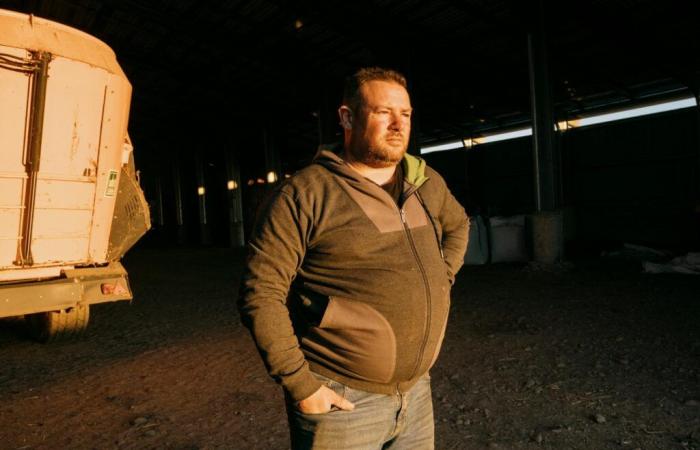This Friday in November, at the beginning of the afternoon, Christophe Piquet leaves by tractor on the roads of Gard. He is going to deliver hay to an equestrian center located about ten kilometers away. Aged 46, this cooperative wine grower and breeder in Bezouce (Gard), a town on the outskirts of Nîmes, offers this type of service to make ends meet.
Read also | Live, farmers' anger: the latest information on the blockages and answers to your questions
Read later
Le Gardois, son, grandson and great-grandson of a farmer, benefited from the family land when he settled. He is at the head of 160 hectares managed in organic farming, around forty owned, the rest rented. “Land has become inaccessible. It is almost impossible to buy land »explains this divorced father of three, who says he is ready to resume mobilization.
In the Gard department, farmers' anger has been mounting for several weeks. Municipal signs were first covered up, before arriving on the prefecture gates… So many actions aimed at preventing a new, larger movement. “From Monday [18 novembre], We're going to turn on hazard lights.”says David Sève, the boss of the departmental federation of farmers' unions (FDSEA) in Gard, who continues: “We have not been heard on essential subjects such as premiums for uprooting vines which must be tax exempt, the constraints which weigh on phytosanitary products without substitute products, Mercosur, or support for farmers in great difficulty and the specificities of our Gard agriculture. »
See also our large format | Article reserved for our subscribers At the roots of the crisis, the daily hardships of farmers
Read later
“It is the State which is targeted”
Christophe Piquet, member of the FDSEA, plans to participate in the movement: “It is the State which is targeted. We are not going to block traffic or penalize the population, but we want to be heard. » And he immediately adds, almost discouraged: “I didn't imagine that we would have to get back into action so quickly. »
Here in Gard, the crisis of farmers, who had completely blocked the A9 motorway, lasted ten days. An unprecedented movement in this department. Emergency aid was paid following the mobilization (8.53 million euros for 982 farms) but the Gard agricultural world believes that the other promises have not been kept. “Simplification measures have not seen the light of day. In organic terms, we got nothing. Many people are desperate and no longer believe in the movement. I have a friend who sold his land and gave up his job”testifies Mr. Piquet.
You have 50.17% of this article left to read. The rest is reserved for subscribers.






